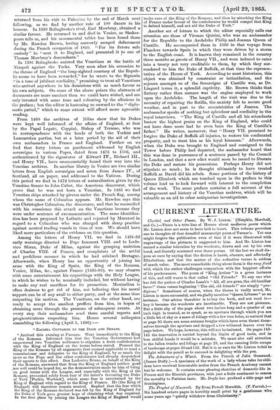C URRENT LITERATURE.
Claribel, and Other Poems. By W. J. Linton. (Siiiapkin, Marshall, and Co.)—There is-a trite line of Horace about mediocres poetce which
Mr. Linton does not seem to have laid to heart. This volume provokes one to thoughts of that dreadful manuscript poem of Turner's. Yet one might forgive the publication even of that if it were illustrated with engravings of the pictures it suggested to him: And Mr. Linton has' earned a similar toleration by the woodcuts, drawn.and cut by his own hand, and literally scattered over these poems. Of the last we shall dis- pose at once by saying that the diction is harsh, obscure, and affectedly Elizabethan, and that the matter of the ,reflective verses is seldom of much value. The most remarkable thing about them is the sangfroid with which the author challenges comparison with the happiest efforts of his predecessors. The poem of "King Arthur" is a gross instance of this, and still worse is that called "Old Friends." To any one who has felt the pathos of Charles Lamb's "All, all are gone, the old familiar faces!" these verses beginning', The old, old friends !" are simply "pro- digious." Sometimes of course, when the theme is really novel, Mr.
Linton is more successful, and we gladly mention "Queen Libussa " as an instance. Our advice therefOre is to buy the book, and not -read it— buy it because the woodcuts are inestimable. They are not pictures.
But a little slip of the page about two inches long and a quarter of an inch high is treated, so to speak, as an aperture through which you see
a little bit of sky or a mass of foliage with a few tree boles, so natural that
at page 95 there are some autumn boughs which have even thrust them- selves through the aperture and dropped a few withered leaves over the page below. We hope, however, this will not be imitated. On pages 143- 145 the innovation is carried beyond the limits of good taste, and in less skilful hands it would be a mistake. We must also call attention to the fallen trunks and foliage at page 28, and the cunning little scraps of landscape at pages 50 and 152. But it is as rare for Mr. Linton to fail to delight with the pencil as to succeed in delighting with the pen.






























 Previous page
Previous page